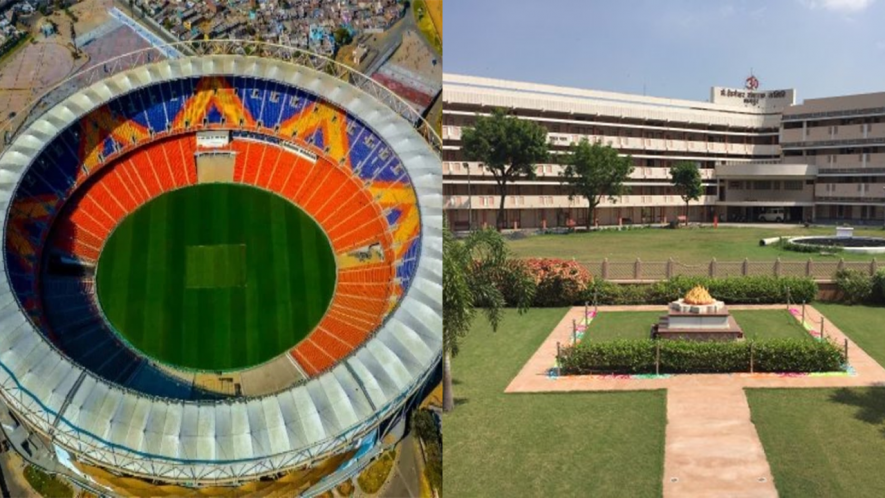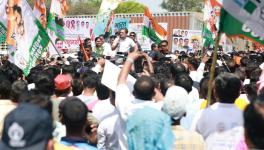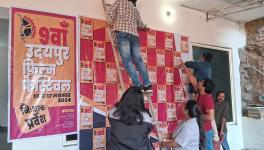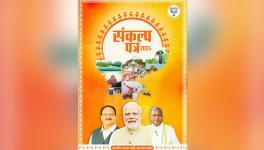Renaming Motera Stadium: The Silence of Nagpur

The naming of the newly reconstructed and now the world's largest cricket stadium in Ahmedabad after Prime Minister Narendra Modi, marks a sharp deviation from the political culture and values that he was groomed in.
The personal glory sought to be bestowed on the Prime Minister by naming a sporting jewel after him, located in a state he administered for 13 years, is in sharp contrast to the principled opposition to Vyakti Pujan (personal deification) within the Rashtriya Swayamsevak Sangh or RSS since 1940. Swayamsevaks, who traditionally join the Sangh when fairly young, are tutored from day one that the sangathan (organisation) is more important than the individual.
Equally conspicuous to the paradigm shift in the political culture to which Modi is now rooted, if not more, is the complete absence of formal reaction to this extraordinary development from the RSS top brass. This can be interpreted in two ways. One, that Modi's dominance of the RSS has become so overpowering that the leadership does not wish to fall foul of him. Two, Nagpur (RSS headquarters) has come to accept the inescapability of 'amoral' tactics -- that it systematically frowned on for decades -- to solidify political support by glamourising charismatic leaders and elevating them to larger than life figures.
In Modi's case, he has enacted this script for almost two decades from when he began paying considerable emphasis on enhancing his visual impact with designer apparel and accessories. The first evidence of the extent to which he would go to using and putting his name on public display, was in January 2015, when he famously wore a bespoke suit with his name woven throughout the fabric during his personal chai-session with United States President Barack Obama.
The RSS was initially uneasy with the concerted bid to create Brand Modi, but has over the years, compromised and come to terms with it. Silence over the renaming of the Motera Sardar Patel stadium is indicative of RSS accepting that in realpolitik, a person has become as important as the politics she or he advocates. RSS old-timers recall the time not many decades ago, when they mocked Maharashtra Congress leader YB Chavan for naming a stadium in Nagpur after himself.
Significantly, Modi started attending RSS activities when still a child, although he formally joined the organisation in the early 1970s, in his early 20s. The early years he spent in RSS, when he was assigned crucial tasks, coincided with the period when traditions that provided ground for deifying the sarsanghchalak were decisively halted by Balasaheb Deoras, the third chief of the body, established in 1925.
While RSS founder Keshav Baliram Hedgewar remains a deified character within the saffron fraternity because he established the organisation, the second sarsanghchalak, MS Golwalkar, is a revered leader because of the detached ascetism he conveyed, despite his liking for the trappings of his position. Golwalkar formally opposed perpetuation of personality cult within the organisation, but took no steps to make changes in traditions that led to glorification of the top leader.
Golwalkar's sympathetic biographer, CP Bishikar, wrote of the sarsanghchalak being completely "averse to use of (his) personal name, fame and publicity."
But, it was Deoras who specified that no memorials of future sarsanghchalaks, including he, shall be constructed in the 21-acre complex in Reshimbagh, Nagpur to those of Hedgewar and Golwalkar. He also directed that photographs of no other leaders, besides these two, shall be displayed on the mantelpiece in RSS offices. He also directed that names of chiefs, barring the first two, would no longer be prefixed with Param Pujya.
Barring odd instances of personal glorification, the RSS has since remained true to Deoras's diktat that respect and reverence should not lead to them being cultified. Modi spent his formative years during the years when these crucial directives were codified. In that way, his decision to 'agree' to name after him, the stadium once named after Sardar Vallabhbhai Patel, is at complete odds with the values and principles with which he was initiated into politics.
Furthermore, in his vilification of the Congress, over the years in government at the Centre and before, Modi laid great emphasis to the party naming streets, colonies, institutions and government programmes after its leaders, principally Jawaharlal Nehru, Indira Gandhi and Rajiv Gandhi. By embarking on the same path, he is open to charges that he follows the same means and his criticism was merely couched in hypocrisy.
While the publicist dimension of Modi's personality has not been hidden from anyone for almost two decades, the RSS leadership's silence on the naming of the stadium underscores its limitations after being co-opted by this regime. The RSS would like to believe that the present arrangement is acceptable to its rank and file because of their belief that while the BJP leadership can be morally deviant in pursuit and consolidation of power, it does not use similar tactics when playing the role of the nation's Executive.
The Modi regime has also mollified the Sangh Parivar by fulfilling many of the fraternity's political objectives and indicating that there is more to come. With these long- standing goals being realised, the RSS leadership is certainly willing to turn a blind eye on other fronts and this includes matters like the stadium's renaming.
This raises a vital question: Is the RSS leadership veering around to the view that the organisation would outlive its utility if the BJP regime establishes complete hegemony over the electoral system? RSS leaders have long said that the ultimate aspiration is for the "Sangh to become the samaj", the RSS fraternity becoming the dominant section in society.
In pursuit of this objective, every moral principle advocated over a century is being exposed as posturing. In recent years, institutions that are connected to RSS leadership and fraternity have parleyed with large corporate empires and secured support for various Parivar-managed projects which though being non-discriminatory, bolsters the fraternity's social presence.
The silence over the naming of the stadium after Modi also demonstrates that the Bharatiya Janata Party is now no longer controlled by RSS, like it once was. In contrast to accepting the larger than life profiles and powers of Modi and his closest aide(s), leaders of almost every other affiliated organisation engaged with the masses, have been consistently downsized in recent years. Witness, for instance, the sidelining in Vishwa Hindu Parishad of Praveen Togadia, well recognised as Modi's bête noire. From a time when political giants like Nanaji Deshmukh and Dattopant Thengadi, kept a check on BJP stalwarts of the time, the field is conspicuously vacant, at behest of the current RSS leadership.
After the 1991 Lok Sabha elections, when BJP leaders were privately claiming of doing spectacularly well, KN Govindacharya, then a principal backroom person, was asked by a few journalists, including this writer, if BJP would eventually replace the Congress.
He burst into one of his loud laughs: "We will not replace, we will be the next Congress."
Seldom has a laugh come back as a sting for the country. The BJP is no longer what it claimed to be, a 'party with a difference'. And Modi has again proved: The Parivar also now is without differences.
(Nilanjan Mukhopadhyay is an NCR-based author and journalist. His has written books -- The RSS: Icons of the Indian Right and Narendra Modi: The Man, The Times. The views are personal.)
Get the latest reports & analysis with people's perspective on Protests, movements & deep analytical videos, discussions of the current affairs in your Telegram app. Subscribe to NewsClick's Telegram channel & get Real-Time updates on stories, as they get published on our website.























